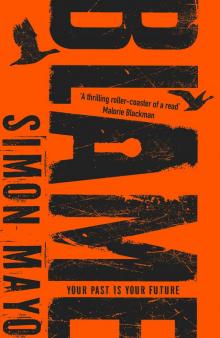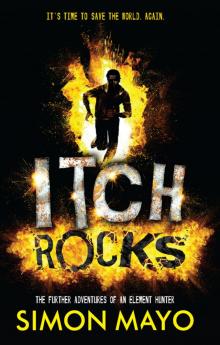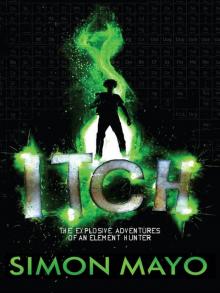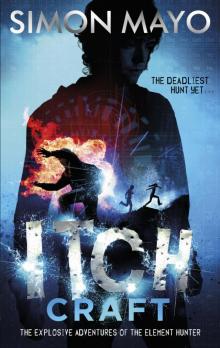- Home
- Simon Mayo
Itch Rocks
Itch Rocks Read online
SPLINTER and the distinctive Splinter logo
are trademarks of Sterling Publishing Co., Inc.
© 2014 by Simon Mayo
Cover photograph (figure) © Alamy
Cover/lettering design: www.blacksheep-uk.com
Previously published in Great Britain by Random House Children’s Books. Published by arrangement with Random House Children’s Publishing, UK, one part of The Random House Group Limited.
All rights reserved. No part of this publication may be reproduced, stored in a retrieval system, or transmitted in any form or by any means (including electronic, mechanical, photocopying, recording, or otherwise) without prior written permission from the publisher.
ISBN 978-1-4549-0512-7
Library of Congress Cataloging-in-Publication Data
Mayo, Simon.
Itch rocks : the further adventures of an element hunter / Simon Mayo.
pages cm
Previously published in Great Britain by Random House Children’s
Books, 2013.
Sequel to: Itch.
ISBN 978-1-4549-0510-3 (hardback)
[1. Chemical elements--Fiction. 2. Adventure and adventurers--Fiction. 3. Cornwall (England : County)--Fiction. 4. England--Fiction.] I. Title.
PZ7.M47367Iv 2014
[Fic]--dc23
2013031758
For information about custom editions, special sales, and premium and corporate purchases, please contact Sterling Special Sales at 800-805-5489 or [email protected].
www.sterlingpublishing.com
For Ben,
the adventurer,
Natasha, the keeper
of the Cake flame,
and Joe, the original
element hunter.
She lay motionless on her iron bed. Any movement would trigger a series of metallic creaks and scrapes, and she needed to listen. It was never quiet in prison, not even at 3:00 a.m., but she filtered out the usual sounds of crying and snoring. She was listening for footsteps. Her eyes were open, but her head was turned to the wall, in case one of the others noticed she was awake. There were nine of them in the cell, but she was the one they would be watching.
She had earned the right to the bottom bed. She’d broken a few noses to get there and no one questioned her position as wing “president” now. Most of the other prisoners did as she said, and if they resisted, her friends would quietly explain the rules. Remind them she could get angry very quickly.
So she stared unseeing at the damp and peeling wall and cursed the occupants of the bed above her. They had started to stir and the old springs were creaking loudly. The beds were stacked on top of each other and there were no mattresses to muffle the sound. The whole cell seemed to fill with noise, and she kicked the metalwork above her, hard. The restless movement stopped.
“Sorry, Shivvi,” said a tiny voice no more than three feet overhead, quickly followed by another.
“Yeah, sorry, Shivvi.”
“Get to sleep, Johanna, you’re driving me crazy. You too, Olufemi. Last warning.”
From the slight, moving indentations, Shivvi Tan Fook determined that the two twelve-year-olds lying above her had just curled into a ball and probably wouldn’t move again until sunrise. She was annoyed with herself for letting the whole cell know that she was awake; how long before they were all asleep again? Thirty minutes, she guessed, maybe more. The heat was unbearable again that night. Even after three years inside, the combination of 95° heat, the stench from their toilet (a hole in the ground), and the constant whine of mosquitoes meant that sleep was always a difficult task. Her long, dirty nails picked at the wall as she ran through her plan again. She was ready, she knew she was ready; she just needed to hear those footsteps.
She sat up after five minutes, her usual patience deserting her. The two bunks above her were silent and the stack of three opposite were still too, except for an occasional grunt and mutter from deep in someone’s dream. The three new arrivals slept on tattered mats on the floor, their arms and legs tangled with a number of plastic bowls. The moldy remains of beans and cassava were scattered everywhere.
She was about to make for the door when she heard a key in the lock. She held her breath as it turned slowly and the ancient pin-tumbler mechanism strained and then clicked. It seemed deafening to Shivvi and she tensed, glancing around the cell, but no one stirred. She counted to twenty, then moved to the door, pushing against its steel panels. It opened slowly, and light from the prison landing fell on one of the floor sleepers. A squinting face looked up at Shivvi who, turning around, drew her finger sharply across her neck. The girl understood the threat well enough and lowered her head to the mat. Shivvi slipped out of the cell.
She had memorized her route to the outside world so many times. She knew the corridors she had to slip down, the rooms she could hide in, and the doors and gates that would be open. She had paid enough. The bribes were at last coming in handy and soon she would be free. Crouching low to avoid being seen from any of the cells, she ran toward the two metal doors at the end of the corridor; she could already see that they were slightly ajar. Her bare feet were noiseless as she sprinted and then slowed down, slipping through them both in a second.
Her wing was on the fourth floor of a block that ran parallel with the front gates of the prison. But as she flew down the flights of stairs—the steel doors stood open at each floor—she knew she was heading in the other direction. There were three staff entrances: one for the caterers and cleaners at the side of the prison and two for the wardens and guards. She had paid for the nearest one to be unwatched and unlocked. She would be there in one minute; the deal was that it would be locked again in three.
The stairs came out at a courtyard at the center of the prison. The air was warm and humid, but in comparison with the fetid stench of the prison, Shivvi thought it was the freshest thing she had ever smelled. She inhaled deeply. She had exercised here many times, but as she looked across to the far side where her open door would be found, she realized she had never seen it empty before. As she checked her route around the cobbled periphery, she briefly caught a familiar stale perfume and whirled around. The vast bulk of Zuma, one of the senior guards, was hurtling toward her. Shivvi jumped sideways—but not quickly enough to escape Zuma’s grabbing hands, which closed around her ponytail. Attempting to throw Shivvi to the ground, the guard pulled down sharply, but Shivvi had been here before. In countless street fights and prison battles she had found herself attacked by bullies and thugs who assumed that because of her five-foot-two, ninety-nine-pound frame, she would be a pushover. They were wrong. As Zuma tugged her down, Shivvi smashed her palm into the guard’s face, splintering her nose instantly. It was her specialty. Zuma let go and put her hands in front of her face, gasping as blood poured between her fingers. Shivvi ran behind her and kicked at her knees. Zuma’s legs buckled and she fell to the ground, groaning.
“Lie down. Lie down, Zuma, or I’ll smash your nose again,” she half whispered, half shouted in the guard’s ear. Zuma did what she was told. “You stay here for ten minutes. You don’t make a sound.” Shivvi bent down and looked her in the eye. “You made my life a misery for three years. I hope you go as crazy in here as I have.” And using Zuma’s head as a starting block, she sprinted for the gate.
The altercation in the courtyard had cost Shivvi some crucial minutes, and as she approached staff entrance A, skipping around open doors and ducking under lit windows, she recognized the silhouette of the guard who had been unlocking the doors for her. With keys in hand, she was about to close up.
“No!” called Shivvi, closing fast, and the guard, looking up, stood aside. They exchanged the briefest of glances, and the former Greencorps oil analyst, convicted polluter, and killer, squeez
ed her way out of the prison and onto the dark back streets of Lagos.
Hiding behind a garden wall, Shivvi Tan Fook retied the band in her black hair and produced a pair of sandals from under her shirt. She slipped them on and looked around, smiling. If anyone had been watching, they would have marveled at the effect that one smile could have on a face. Despite her twenty-five years—the last three spent in one of the most notorious prisons in Africa—she could still look like a teenager.
“Now,” she said out loud, “Dr. Nathaniel Flowerdew.” She spat the words. “I believe we have an appointment.” And she started to run through the still-dark streets, away from the prison and toward the harbor.
The most protected boy in the world was in his bedroom making chlorine gas. Having failed in his attempts to buy any, he was mixing his own. Nowadays, the only time he had to himself was before everyone got up, so he had been setting his alarm for 6:00 a.m. A tattered old book lay open on the floor, and Itch, kneeling down in his pajamas, read the instructions aloud.
“Add five grams of manganese dioxide …” He scooped up a small quantity of black powder from a dish and tipped it into his test tube. “Now add the hydrochloric acid and heat gently.”
From an old cookie tin he produced a small bottle of clear liquid and measured the suggested 3 ml, dripping in the exact amount. Warming the mixture with an old lighter, he picked up another test tube, ready to catch the gas. It wasn’t the most efficient way of collecting a sample of element number 17 for his collection, but it would have to do.
As the mixture began to bubble, Itch leaned eagerly toward the tube. Unfortunately he miscalculated by a few inches. The error was small but the effect was huge. Chlorine gas seared into his lungs like fire and he dropped the test tube. His gasp sounded like he was being throttled. In the quiet house, it was like an alarm going off.
Seemingly from nowhere, three figures crashed through his bedroom door.
“Call Fairnie!” shouted the leader. “And check the room.” She half carried Itch, coughing and retching, back down the stairs.
“Are you OK, Itch?” asked the woman, setting him down on a kitchen chair. “Can you breathe?”
Itch nodded, his eyes pressed tightly together but watering anyway. The back door was open, and through it appeared a small, athletic man with a neat black moustache.
“Chlorine gas, sir,” barked the woman, her voice loud in the kitchen. “Small tube. Self-inflicted.”
“Take him outside,” sighed Dr. Jim Fairnie. “He needs the air.”
She led Itch out into the floodlit backyard and sat him on the kitchen step. After Itch had taken a few deep breaths, Fairnie knelt down beside him.
He tapped Itch on the shoulder and waited for him to open his eyes. “Idiot,” he said.
“Sorry,” croaked Itch. “Thought I could bottle some before school….” He broke off, coughing.
Fairnie looked up as Nicholas and Jude Lofte appeared behind them in the kitchen. They were both tall—Nicholas easily six four—but it was Jude that Itch most closely resembled; their hair alike—mousy, wavy, and uncontrolled. “He’s fine! He’s fine!” he called before they could say anything. “Just a little chlorinated mouthwash to start the day. He’ll be OK just as soon as his lungs have stopped burning. Give him five minutes.”
Itch’s parents stared at their son, then at the man in charge of his security.
“But what happened?” asked his father. “It’s six in the morning, for heaven’s sake!”
As if in answer to Nicholas’s question, the two men who had been checking Itch’s bedroom appeared in the doorway holding a bag of smashed chemistry equipment.
Jude Lofte rolled her eyes. “You’ve got to be kidding.”
Itchingham Lofte had been allowed to go home at the beginning of October, after three months in a military hospital.
And “home” was now very different.
MI5 had taken over his house and forced the neighbors to move. Dr. Fairnie—who was also a colonel in the British army—ran a cell of seven agents from what had been the Cole family’s house next door. There were three on duty, three off, twenty-four hours a day. (The final member of the team had moved in with Itch’s cousin Jack and her family.) On every window, the Lofte house now had steel shutters that could be lowered if there was a perceived threat. There was a very visible closed-circuit TV at the front and back of the property, and a complex alarm system triggered by laser beams that crisscrossed the yard. Inside, there were cameras downstairs but, by common agreement, none upstairs.
The fence between the two semi-detached houses had been removed and replaced with powerful lighting, a satellite dish, and a generator. In the Coles’ house, the living room was now stuffed with a series of monitors, running images from inside and outside the house next door. Other cameras showed the roads around the town and the Cornwall Academy, the school attended by Itch and his twelve-year-old sister, Chloe.
The agents tried to interfere with family life as little as possible, keeping to the kitchen as much as they could. The on-duty team had one person watching the monitors while the other two people patrolled the backyard.
And all this because a man named Cake had given Itch a rock. It had looked unremarkable enough—brown and pebble-size—but that rock had turned out to be the previously undiscovered element 126. Highly radioactive and extremely powerful, its value was incalculable—but so was the danger it presented. Depending on who controlled it, element 126 had the potential to solve the world’s energy crisis or make its owner a nuclear power overnight.
Itch’s science teacher, Dr. Nathaniel Flowerdew, had been quick to spot its value. He’d stolen it from Itch, who promptly stole it back with the help of Chloe and their cousin Jack. When Cake died from radiation poisoning, they found that he had left behind seven more of the radioactive rocks, and the Lofte cousins had been forced on a race against time to keep them out of Flowerdew’s hands.
In the end, Itch had managed to evade Flowerdew and leave the rocks at the bottom of a very deep well. By the time he had completed his mission, he was almost dead from radiation poisoning. Itch didn’t know who had carried him out of the well and left him at a nearby hospital, but his mysterious rescuer was the only other person who knew the final resting place of element 126. The identity of this person was a continual worry to Itch: whoever it was knew his secret. Would whoever it was retrieve the rocks he had gone to such lengths to hide? What were their motives? If it was Flowerdew or Greencorps, wouldn’t they have acted already?
The reward for Itch’s heroics had been an emergency bone-marrow transplant, followed by three months of recovery and interrogation by MI5 agents, who were desperate to know where the rocks were hidden. When it became clear that Itch wasn’t going to tell them, the British government finally allowed him to go home. But, of course, they couldn’t run the risk of anyone else forcing him to give up his secret. And so the government had come with him.
The Loftes now lived with MI5. Nicholas had given up his job on the oil rigs and was living at home permanently for the first time that Itch could remember. Chloe, who had recovered from her own less-serious radiation poisoning, had made the adjustment to their new lifestyle with ease. Itch suspected she secretly rather enjoyed the drama that Fairnie and his team brought with them. She had certainly made herself popular with her homemade cookies.
Itch and Chloe had an older brother, Gabriel, who was away at Warwick University. Apart from a brief visit when Itch was discharged from the hospital, Gabriel hadn’t come home—a fact that Jude Lofte was not very happy about. In fact, apart from having her son Itch back home and—all things considered—healthy, Jude Lofte, a lawyer, didn’t seem happy about very much at all. She didn’t like the way MI5 “messed up the backyard,” or the disruption they caused to her normal routines; she certainly didn’t like having them in the house. Itch suspected that she secretly wished he would go ahead and tell Fairnie where he had hidden the rocks, just so they could all go back to living
their normal lives.
That November morning found Itch and Chloe having breakfast with two of the daytime security team, Sam Singh and Tina Greaves. The third member was an ex-marine named Moz Taylor, doubtless watching them from the monitors next door. Tina was the team leader and an army vet, while Sam was as much a science nut as Itch and was giving him a hard time about the chlorine.
“I would have thought you’d put your body through enough without inhaling poison gas for fun.”
Itch was irritated—both by the criticism and by his mistake. “I know, I know,” he snapped. “I told Colonel Fairnie I was sorry, didn’t I? It was only a tiny amount. I didn’t need rescuing like that. Now Mum’s mad again.”
“Mum is always mad,” said Chloe, pouring herself a cup of tea. “You know that. But if I’d heard you choking, I might have raised the alarm too.”
“You need a history lesson, Itch,” said Sam. “Try looking up how chlorine gas was used in the First World War and then see if you still want to inhale some.”
“I wasn’t trying to…. Oh, never mind. I’ll do without chlorine. Go for something more fun, like mercury, instead.” Itch checked the clock. “Time to go?”
“Give me five,” said Chloe.
Tina spoke into the tiny microphone in her sleeve. “School run in five minutes.”
“School run” was actually shorthand for the complex operation needed to get Itch and Chloe to and from Cornwall Academy; it required the whole team. The walk to school was the same as it had always been: down the hill toward the sea, across the golf course, then through the town. Itch and Chloe used to go by themselves. Now they had two agents walking sixty-five feet in front and another two sixty-five feet behind. Two more followed in a white van with blacked-out windows. All six were in constant radio contact, while Colonel Fairnie monitored events from the Coles’ house.
When Itch and Chloe first returned to school, Jude and Nicholas had assumed that the kids would be driven there in the van, but Jim Fairnie had said no.

 Blame
Blame Itch Rocks
Itch Rocks Mad Blood Stirring
Mad Blood Stirring Itch
Itch Itchcraft
Itchcraft